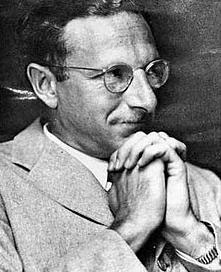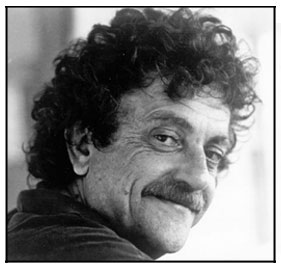Dr. Eric Berne
Canadian-born psychiatrist, Eric Berne, M.D. (1910-1970), was the creator of transactional analysis and author of several bestselling human relationship books that explored both functional and dysfunctional social interactions. His popular books include 'Games People Play' and 'What Do You Say After You Say Hello?' Transactional Analysis is a model of psychotherapy based on the idea that emotionally intense memories from childhood are ever-present in adults. Berne studied the verbal and non-verbal interchanges (‘transactions’) between people, hence the model’s name Transactional Analysis (T.A.). The origin of T.A. occurred during a therapy session with a successful middle-age lawyer (1954) who told Dr. Berne, “I’m not really a lawyer. I’m just a little boy.” Intrigued by that comment, the doctor said, "That's interesting. Tell me more." The birth of T.A. began. Dr. Berne’s overriding purpose was to make other people happy. "We want patients to hear the birds sing," he can say, making it sound like a duty other people are shirking. "We encourage that kind of childlike awareness. Patients who really do hear the birds and see the trees get very excited." From his insights from transactional studies, Berne abandoned his desire to help patients get better. "We don't want patients to make progress," he says. "We want them to get well. Or, in our lingo, we want to turn frogs into princes. We're not satisfied with making them braver frogs." Dr. Berne had his quarrels with his contemporaries with the release of his new ‘pop psychology’. Confident of his new TA model, Berne noted, "I think Freud would consider most analysts today nothing but picture straighteners," he says. "They may be good teachers, but they don't publish enough to share their insights."…"Life is really very simple. But if people have to face that fact they get very upset. So they invent religions and pastimes and games. These are the same people who then lament how awful it is that life is complicated. But all complications involve decisions, and a person must assess the probabilities and possibilities, make the best decision and then go down the street whistling." In his review of 'Games People Play', novelist Kurt Vonnegut Jr. gave these thoughts in a Life magazine article (1965),
“This is an important book—if not to
scientists, then to laymen in their anguished need for simple clues as to what is really going on. It also
fricassees the canard that a novelist or playwright, with his magic intuition, can reveal more about life than any
physician could ever know. The good Doctor, meaning only to add his insights to the healing arts, has provided
story lines that hacks will not exhaust in the next 10,000 years. T.A. in a Nutshell Scripts There are many scripts: ‘hero’, ‘tragic’, ‘winner’, ‘non-winner’, ‘loser’, ‘wither away’, ‘don’t make it’. They all have fascinating characteristics: positions, games, rackets, trading stamps and sweatshirts. Examples of positions include “I’m not O.K. because I complain.” “They’re O.K. because they have things” (‘Little Pink Riding Hood’); An example of a ‘nonwinner’ script is the ‘Old Soldier’ where the slogan is “You can’t get ahead until they need you again”. It is based on an “After” plan, “After the war is over you can only fade away.” The waiting time is filled by helping people and soldier talk. An example of a ‘loser’ script is the ‘Red Queen’ (Alice in Wonderland) where the slogan is "It is far better to be feared than to be loved" (young Alice’s position is I'm OK, You're-not-OK; her challenge is to take on the moral dualism of the Victorian culture - putting women on a ‘pedestal’ but doing another). Cognitive therapists have learned that in most cases of depression, people follow false scripts, and they keep repeating the beliefs, or myths, as if they were they were true. The depressed talk to themselves in untruthful ways: “If I don’t get this job, my life is over”; “If she doesn’t love me, nobody will.” In his High School days, the author of The Golden Seat witnessed a real life example of the games people play. During a break in a workout sequence the swim coach caught some team members complaining about the workout. “Enough of that!” he shouted. Coach Bird astutely explained the game going on: complaining members publicly voicing their feelings among the other swimmers to get them to ‘buy in’ to their position (“Ain’t it Awful”). The smart, winning coach won’t tolerate such games. In the end, scripts are just artificial systems which limit spontaneous and creative human aspiration. In script analysis, winners are called “princes” or “princesses,” and losers are called “frogs.” The object of script analysis is to turn frogs into princes and princesses. The therapist has to find out who the good guys and bad guys are in the patient’s script, and also what kind of a winner he can be. The patient fights being a winner because he is not in treatment for that purpose, but only to be made into a brave loser. Life scripts are based on parental programming where the child learns life purpose and how to do things. A man does not become a good pilot by wrecking a few airplanes and learning by his errors. A surgeon has to have a teacher. Parents program their children by passing on to them what they have learned, or what they think they have learned. If they are losers, they will pass on their loser’s programming, and if they are winners, then they will pass on that kind of programming. The child is often free to select his own plot, and even the anti-script, which is the defiant opposite of the directive calls for. If the child has alcoholic parents, he can choose not to be. If she has financially successful and responsible parents, she can choose to be a free-spirit but penniless drifter. A word Dr. Berne often uses is "permission." If a man fails in every job, his Parent is not giving him permission to succeed. The therapist must then trace the reasons and help him to see that he has every right to do a job well and reap the rewards. Researchers in past-life regression studies have discovered ‘metaphysical scripts’ called Themes or charts. The theory is that on the ‘other side’ we compose our ‘blueprint’ before we are born. We choose two of forty-five life themes for the upcoming existence on Earth – a primary theme, which is who we are, and a secondary theme, which is what we’re here to work on. Figuring out what and which they are is a valuable exercise for clarifying and simplifying our lives. Having a frame of reference of the basic ‘itinerary’ of this life can help keep us on track. It may take many lifetimes or a few, depending on what measure of spirituality the soul wishes to attain. When the attainment has been reached, the soul then goes Home and stay there and keeps on learning, but not with the negativity of this world. We rail against the negativity, but without it we would not learn. Only in adversity do any of us learn. This is how we test the mettle of our souls. What Do You Say
After You Say Hello? When the talking is not customary, courage is often required if the rejection is legitimate. Dr. Berne recommends Ovid, The Art of Love, Book I. “Ovid’s suggestions are just as good for New York, San Francisco, London, or Paris of today as they were for Rome two thousand years ago. If you make it with Book I, you will be ready to go on to the more advance stages in Book II, and if that works out you will be ready for home plate, which is Book III.” When the talking is forbidden, as on the New York subway, only people with very hard scripts will try it. To “make good on the title of the book”, Dr. Berne offers the following stories and suggestions, “out of courtesy”, The classical joke here concerns the man whose conversation with women ran as follows: “Hello.” “Hello.” “Would you like to go to bed?” A friend advised him that it would be better to make some conversation before he asked the question. So the next time he was introduced to a girl, he said: “Hello. Have you ever been to Ethiopia?” “No.” “Then let’s go to bed.” Actually that is not a bad line. Here are some possibilities. Wistful: “Hello.” Naïve: “Hello.”
|

